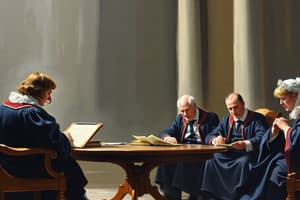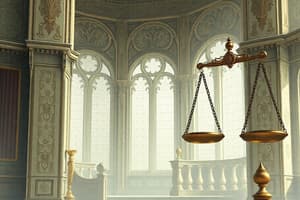Podcast
Questions and Answers
What is one of the primary roles of the Judiciary in the UK?
What is one of the primary roles of the Judiciary in the UK?
- Adjudicating conflicts between individuals (correct)
- Conducting elections
- Enforcing political decisions
- Making laws exclusively without interpretation
Which Constitutional Act formalized the functions of the Judicial Appointments Commission?
Which Constitutional Act formalized the functions of the Judicial Appointments Commission?
- Constitutional Reform Act 2005 (correct)
- Judicial Review Act 2005
- Judicial Powers Act 2005
- Constitutional Functions Act 2005
What must the Judicial Appointments Commission prioritize when selecting candidates for judicial positions?
What must the Judicial Appointments Commission prioritize when selecting candidates for judicial positions?
- Merit and integrity (correct)
- Political affiliation
- Experience in public advocacy
- Availability of judges in local areas
In how many court systems does the UK's judiciary operate?
In how many court systems does the UK's judiciary operate?
What is a key function of the Supreme Court established in 2009?
What is a key function of the Supreme Court established in 2009?
Who must the Judicial Appointments Commission consult before selecting Supreme Court members?
Who must the Judicial Appointments Commission consult before selecting Supreme Court members?
What happens if the Lord Chancellor rejects a nomination from the Judicial Appointments Commission?
What happens if the Lord Chancellor rejects a nomination from the Judicial Appointments Commission?
What kind of conflicts does the Judiciary primarily adjudicate?
What kind of conflicts does the Judiciary primarily adjudicate?
What is the primary function of the Prime Minister concerning judicial appointments as outlined in Sec. 26 (3) CRA 2005?
What is the primary function of the Prime Minister concerning judicial appointments as outlined in Sec. 26 (3) CRA 2005?
According to the Act of Settlement 1701, under what condition can a judge be removed from office?
According to the Act of Settlement 1701, under what condition can a judge be removed from office?
What significant change occurred regarding the Lord Chancellor's role with the introduction of the CRA 2005?
What significant change occurred regarding the Lord Chancellor's role with the introduction of the CRA 2005?
Which of the following best describes the independence of judges in terms of their immunity from suit?
Which of the following best describes the independence of judges in terms of their immunity from suit?
In R (Anderson) v Home Secretary, what aspect of the law was determined to be incompatible with Article 6(1) ECHR?
In R (Anderson) v Home Secretary, what aspect of the law was determined to be incompatible with Article 6(1) ECHR?
What protection did the Senior Court Act 1981 provide for judges?
What protection did the Senior Court Act 1981 provide for judges?
Which of the following roles does the Attorney General fulfill?
Which of the following roles does the Attorney General fulfill?
What requirement must a Lord Chancellor meet according to Sec. 2 (2) CRA 2005?
What requirement must a Lord Chancellor meet according to Sec. 2 (2) CRA 2005?
What constitutional convention was associated with the Lord Chancellor before the CRA 2005?
What constitutional convention was associated with the Lord Chancellor before the CRA 2005?
Which article of the ECHR relates to a fair trial by an independent tribunal?
Which article of the ECHR relates to a fair trial by an independent tribunal?
What is one of the key statutory duties of the Judicial Appointments Commission under the CRA 2005?
What is one of the key statutory duties of the Judicial Appointments Commission under the CRA 2005?
Which court system is part of the UK's judiciary?
Which court system is part of the UK's judiciary?
What must the Lord Chancellor do upon receiving nominations from the Judicial Appointments Commission?
What must the Lord Chancellor do upon receiving nominations from the Judicial Appointments Commission?
When was the Supreme Court established as the highest court in the UK?
When was the Supreme Court established as the highest court in the UK?
What is one of the roles of the European Court of Human Rights?
What is one of the roles of the European Court of Human Rights?
What principle concerning diversity does the Judicial Appointments Commission emphasize?
What principle concerning diversity does the Judicial Appointments Commission emphasize?
How does the Supreme Court's jurisdiction differ from that of the House of Lords?
How does the Supreme Court's jurisdiction differ from that of the House of Lords?
What is one of the ways the Judiciary aids in constitutional functions?
What is one of the ways the Judiciary aids in constitutional functions?
What is the primary change in the role of the Prime Minister regarding judicial appointments as established by Sec. 26 (3) CRA 2005?
What is the primary change in the role of the Prime Minister regarding judicial appointments as established by Sec. 26 (3) CRA 2005?
What constitutional document provides for the removal of judges based on good behavior?
What constitutional document provides for the removal of judges based on good behavior?
Which statement best describes the Lord Chancellor's role post-CRA 2005?
Which statement best describes the Lord Chancellor's role post-CRA 2005?
What is one major function of the Attorney General?
What is one major function of the Attorney General?
What principle is emphasized by Lord Denning in Sirros v Moore regarding judicial immunity?
What principle is emphasized by Lord Denning in Sirros v Moore regarding judicial immunity?
Under Article 6(1) ECHR, what aspect must a tribunal fulfill to ensure a fair trial?
Under Article 6(1) ECHR, what aspect must a tribunal fulfill to ensure a fair trial?
In the context of R (Anderson) v Home Secretary, which party was determined not to be an independent tribunal as per Article 6(1)?
In the context of R (Anderson) v Home Secretary, which party was determined not to be an independent tribunal as per Article 6(1)?
What does the Crown Proceedings Act 1947 guarantee for judges?
What does the Crown Proceedings Act 1947 guarantee for judges?
What is the new qualification requirement for the appointment of the Lord Chancellor as per Sec. 2 (2) CRA 2005?
What is the new qualification requirement for the appointment of the Lord Chancellor as per Sec. 2 (2) CRA 2005?
Flashcards
Supreme Court
Supreme Court
The highest court in the UK, assuming the appellate functions of the House of Lords and the devolution jurisdiction of the Privy Council.
Judicial Appointments Commission (JAC)
Judicial Appointments Commission (JAC)
The process of selecting judges and tribunal members focusing on merit, good character, and diversity.
Judicial Review
Judicial Review
A legal principle that allows individuals to challenge the legality of government actions in court.
Common Law
Common Law
Signup and view all the flashcards
Interpretation of Legislation
Interpretation of Legislation
Signup and view all the flashcards
Adjudicate Conflicts
Adjudicate Conflicts
Signup and view all the flashcards
Apply Legislation
Apply Legislation
Signup and view all the flashcards
Separation of Powers
Separation of Powers
Signup and view all the flashcards
Supreme Court Composition (CRA 2005)
Supreme Court Composition (CRA 2005)
Signup and view all the flashcards
PM's Role in Supreme Court Appointments (CRA 2005)
PM's Role in Supreme Court Appointments (CRA 2005)
Signup and view all the flashcards
Judges' Tenure (Senior Court Act 1981)
Judges' Tenure (Senior Court Act 1981)
Signup and view all the flashcards
Judges' Tenure (Act of Settlement 1701)
Judges' Tenure (Act of Settlement 1701)
Signup and view all the flashcards
Judicial Immunity from Suit
Judicial Immunity from Suit
Signup and view all the flashcards
Lord Chancellor's Functions (Pre-CRA 2005)
Lord Chancellor's Functions (Pre-CRA 2005)
Signup and view all the flashcards
Lord Chancellor's Functions (Post-CRA 2005)
Lord Chancellor's Functions (Post-CRA 2005)
Signup and view all the flashcards
Attorney General's Functions
Attorney General's Functions
Signup and view all the flashcards
Attorney General's Dual Role
Attorney General's Dual Role
Signup and view all the flashcards
Impact of the Human Rights Act on Judicial Independence
Impact of the Human Rights Act on Judicial Independence
Signup and view all the flashcards
What is the UK's Supreme Court?
What is the UK's Supreme Court?
Signup and view all the flashcards
Who selects judges in the UK?
Who selects judges in the UK?
Signup and view all the flashcards
What is Judicial Review?
What is Judicial Review?
Signup and view all the flashcards
Explain the concept of 'Common Law'.
Explain the concept of 'Common Law'.
Signup and view all the flashcards
What is the 'Separation of Powers' principle?
What is the 'Separation of Powers' principle?
Signup and view all the flashcards
What is the role of the European Court of Human Rights (ECtHR)?
What is the role of the European Court of Human Rights (ECtHR)?
Signup and view all the flashcards
What types of cases does the ECtHR handle?
What types of cases does the ECtHR handle?
Signup and view all the flashcards
What is the role of the Lord Chancellor in the UK?
What is the role of the Lord Chancellor in the UK?
Signup and view all the flashcards
Judges' Tenure: Senior Courts Act 1981
Judges' Tenure: Senior Courts Act 1981
Signup and view all the flashcards
Judges' Tenure: Act of Settlement 1701
Judges' Tenure: Act of Settlement 1701
Signup and view all the flashcards
Judges' Immunity from Suit
Judges' Immunity from Suit
Signup and view all the flashcards
R (Anderson) v Home Secretary: Judicial Independence and Article 6(1)
R (Anderson) v Home Secretary: Judicial Independence and Article 6(1)
Signup and view all the flashcards
Study Notes
UK Judiciary - Overview
- Three court systems operate in the UK: England and Wales, Scotland, and Northern Ireland.
- The Supreme Court is the UK's final court of appeal.
- Courts adjudicate disputes between state institutions, the state and individuals, and individuals.
- Courts apply, interpret, and identify constitutional sources (e.g., prerogative powers), and create common law.
- The Supreme Court's jurisdiction as the final court of appeal in the UK was reaffirmed in 2010.
Constitutional Functions
- Courts settle disputes between the government and individuals (e.g., judicial review) and between government bodies.
- They handle private disputes under civil law.
- They enforce and interpret legislation, including the Human Rights Act 1998.
- They determine the existence of prerogative powers, applying legislation and identifying constitutional sources.
Judicial Appointments
- The Judicial Appointments Commission (JAC) selects Supreme Court judges and recommends appointments to the Lord Chancellor. It also selects other judges and tribunal members.
- The JAC selects candidates based on merit, good character, and promotes diversity.
- Consultation with the Lord Chancellor, senior judges, and senior ministers (Scotland, Wales, and Northern Ireland) is mandatory.
- The JAC’s key duties under the Constitutional Reform Act 2005 include: selecting candidates based on merit, good character, and encouraging diversity.
- The Lord Chancellor can accept, reject, or request reconsideration of JAC nominations.
- If a candidate is rejected, the JAC cannot select them again.
Supreme Court
- Established in 2009, it replaced the House of Lords' appellate function and took over the Privy Council's devolution jurisdiction.
- The Supreme Court's composition significantly reduces the Prime Minister's role in appointments.
- Existing Law Lords and Justices became Supreme Court members.
- The Senior Law Lord serves as President of the Supreme Court.
Independence of the Judiciary
- Judges hold office during good behavior. Removal is possible by the Crown, advised by Parliament (Senior Courts Act 1981).
- The Act of Settlement 1701 safeguards judicial tenure and salary, and judges are immune from suit in the UK (Crown Proceedings Act 1947).
- In the Anderson case, the Home Secretary's role in fixing minimum sentences was part of a trial, so was meant to be undertaken by an independent tribunal (under Article 6 of the ECHR).
Impact of Constitutional Reform Act 2005
- The Lord Chancellor's role has changed significantly: they are no longer the head of the judiciary (now held by the Lord Chief Justice), are not automatic speakers of the House of Lords, must demonstrate relevant experience as a minister, practitioner, teacher, etc., and are a member of the Cabinet (House of Commons).
- Qualifications for the Lord Chancellor under the CRA 2005 include experience as a minister, in either House of Parliament, a practitioner, a law teacher, or other relevant experience.
Attorney General
- The Attorney General advises the government legally and manages the criminal justice system.
- They have powers to halt criminal proceedings (e.g., under the Bribery Act 2006).
- The Attorney General serves as both a minister and a legal advisor to the Crown.
European Court of Human Rights (ECtHR)
- Individuals can bring cases against a state to the ECtHR.
- States can also be involved in cases, but domestic remedies must be exhausted first.
Case Study: R (Anderson) v Home Secretary
- The case illustrates the application of Article 6 of the European Convention on Human Rights, concerning fair trials.
- Anderson, convicted of double murder and sentenced to a minimum of 15 years' imprisonment, sought judicial review of the Home Secretary's increase of his minimum term to 20 years, arguing this was a breach of Article 6(1).
- The Home Secretary's decision to set a minimum term isn't independent enough for a valid trial under Article 6(1). The fixing of a tariff was indistinguishable from imposing a sentence.
Studying That Suits You
Use AI to generate personalized quizzes and flashcards to suit your learning preferences.




